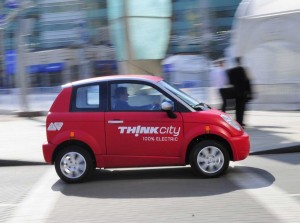Bankrupt battery car maker Think Global could get a second – make that fourth – chance, a Russian investor getting court approval to re-launch the brand, which went belly-up last month.
The new owners plan to rename the long-troubled company Electric Mobility Solutions AS but will continue to operate it out of Norway – with subsidiaries in both the U.S. and United Kingdom. Those operations continued even while the Norwegian parent faced the possibility of a court-ordered break-up.
“Having achieved the position of one of the world’s most highly regarded electric vehicle products, the THINK brand is a valuable asset that deserves to continue its key role in the global shift to electrification,” Russian investor Boris Zingarevich said in a statement.
“With the potential of working with the leading American automotive lithium-ion battery maker and Europe’s top automobile engineering and manufacturing company, I believe we could have exactly the right combination and value chain to ensure that the brand will be increasingly competitive in the worldwide electric vehicle market,” he added.
Zingarevich has been a member of the board of Ener1, the U.S.-based battery maker that helped trigger Think’s latest brush with bankruptcy when it decided to try to recover $32 million in debt. Reports indicate the businessman had indirect control of as much as a 40% stake in Think already. He’s also reportedly well linked in Russian political circles, notably to Russian President Dmitri Medvedev and Prime Minister Vladimir Putin.
Exactly what’s in store for Think isn’t clear, though it appears the company will continue to try to market its little City battery car, putting an emphasis on fleet sales, though it is offering the 2-seater to some retail customers, as well. The latest company statement indicates that as Electric Mobility Solutions, the old Think will continue honoring service and warranty contracts.
The maker has had a harder time than expected building demand for the plastic-bodied Think City, which uses lithium-ion batteries to deliver a range of up to about 100 miles. Despite its smaller size, the latest version of the City was expected to carry a price tag of around $35,000 – about as much as a larger Nissan Leaf – prior to a $7,500 U.S. tax credit.
Earlier this year, Think announced it would be building the City at a new plant in Elkhart Lake, Indiana. Those plans will move ahead.
Though Think routinely bills itself as the world’s “leading” electric vehicle manufacturer it has had a troubled 20-year history. Briefly owned by Ford Motor Co., it was purchased by GE and other investors, in 2006, after the Detroit maker wrote off its investment. It went broke again in 2008, emerging from bankruptcy only last year with the help of Ener1.


